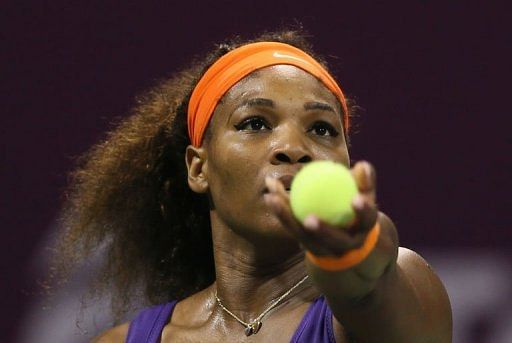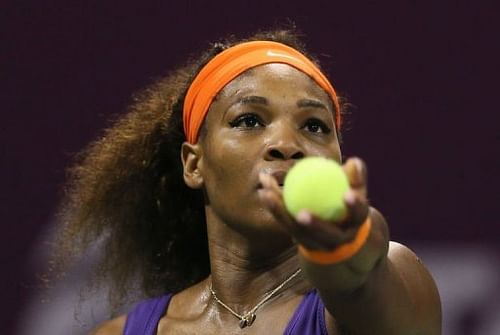
Insatiable Serena hungry for more glory
DOHA (AFP) –

Serena Williams of the US serves to Czech Republic’s Petra Kvitova during their WTA Qatar Open quarter-final on February 15, 2013 in the Qatari capital Doha. Williams, who becomes the oldest player to be ranked world number one in WTA Tour history, believes she can go on extending that record for some time.
Serena Williams, who becomes the oldest player to be ranked world number one in WTA Tour history on Monday, believes she can go on extending that record for some time.
Williams, who made sure of the accolade by reaching the Qatar Open semi-finals yesterday, is at 31 years and five months, already six months older than the previous record-holder Chris Evert, and has plans to continue indefinitely.
The 15 times Grand Slam tournament winner believes she knows why her body feels younger than it is, and may have her coach Patrick Mouratoglou, the director of the well-known tennis academy in Paris, on tour with her full-time this year.
“It’s very important for me (to stay number one),” Williams said. “I think it’s important for everyone at the top. And it’s not so lonely as it looks at the top.”
This was part reference to the range of congratulations she received, from spectators, well-wishers worldwide, and many fellow players, and from the Paris St Germain football team, which trains here in Doha, and whose President, Nasser Ghanin Al Khelaifi, gave her a personalized Paris Saint-Germain jersey.
There was also congratulatory advert from Nike, a sponsor, depicting her with a slogan “Age is Just a Number.”
Questioned if that was what she thought, and asked how her body feels on court now, she replied: “Fine.
“Honestly, I have been saying that I feel really young, like I’m 22 or something,” she added.
“So I don’t know if it’s because I don’t play every week, but I feel great. Hopefully I can keep it going.”
A key to future longevity almost certainly lies in not playing too many tournaments.
“I have never played 30 tournaments in a year,” Williams pointed out. “I didn’t play juniors, so I didn’t travel the world and get burned out early.
“I went to school. I also had a couple of unfortunate injuries that put me out for a year, and maybe that helped at the end of the day.”
Another key is the nature of her game, with its almost perfect service action, great weight of shot, unrivalled experience, and many mental qualities, the most important of which is enduring motivation.
That became evident with her surprise at the intensity of her own reactions at winning the top spot back after an interval of two and a half years.
They were so powerful they reduced her to tears several times.
“I didn’t imagine that it meant that much to me,” she admitted.
“I did not expect to not be able to stop crying. I didn’t expect to feel that way at all. I just thought I would be happy and, you know, just move on to the next round.
“But my reaction was completely unexpected from me. It was completely surprising, but it was nice. It was really genuine, and it felt good.”
Williams will now pick and choose tournaments carefully, probably with even more emotional support from a bolstered back-up group as she moves into the last phase of an unorthodox and dramatically unpredictable career.
There may be increasingly powerful opposition.
Victoria Azarenka, the 23-year-old Australian Open champion from Belarus who remains world number one until Monday, Maria Sharapova, the French Open champion from Russia who is a former number one, and perhaps from Petra Kvitova, the 22-year-old former Wimbledon champion from the Czech Republic could all make a fist of it.
But what captures the imagination most about Williams’ comeback – and may guarantee that she hangs on as long she can – is that she recovered from a pulmonary embolism which threatened her life.
“There’s often been times that I never thought I’d play again,” she said. “I thought I’d never be able to win tournaments or Grand Slams. Number one was so far off.
“It was always a dream, but I was number one when tragedy struck, and it was just an awful thing to happen. So I’m really happy I’m back.”